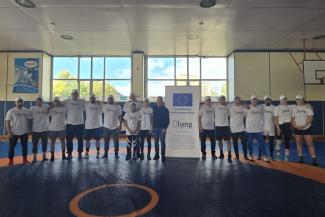Georgia Grabs Greco-Roman U23 European Team Title
Wednesday, March 6, 2019 - 21:05 By Eric Olanowski

NOVI SAD, Serbia (March 6) – Georgia (178 points) wrapped up the Greco-Roman team title at the U23 European Championships, 11 points ahead of second-place Russia (167 points). They closed out the final day of Greco-Roman wrestling with a solo gold medalist and brought their tournament championship total to five.
Ramaz ZOIDZE was Georgia’s fifth overall gold medalist. He won the 72kg title with a controlling 7-1 victory over Russia’s Magomed YARBILOV (RUS).
Georgia’s second Day 3 finalist was Giorgi MELIA (GEO). Melia fell to Finland’s Arvi SAVOLAINEN, 4-1, in the 97kg gold-medal match. The Georgian led 1-1 on criteria but gave up a late takedown and a lost challenge dropping the match, 4-1. Although he didn’t leave as a titleholder, Melia’s silver medal still helped Georgia win the team title by claiming his 20-second place points.
Meanwhile, second-place Russia had a trio of Day 3 finalists but only walked away with a single champion.
Alen MIRZOIAN claimed Russia’s second overall gold of the tournament, blowing out the host nation’s Sebastian NAD, 10-0, in the opening period of the 67kg gold-medal bout.
Mirzoian grabbed the 1-0 lead with a passivity point, then quickly went to work in the par terre position. The Russian picked up two points from a leg foul and added a point from a failed Serbian challenge, which brought the score to 4-0. The returning U23 European champion closed out the match 10-0 with a four-point throw and a gut wrench for good measures.
In the 82kg finals, Zotlan LEVAI (HUN) trailed 1-1 on criteria before picking up the match's first takedown to steal the gold medal from Russia’s third finalist Vaag MARGARIAN, 3-1.
Levai's Wednesday night win gave him his second U23 European title. He also won the 2017 U23 European title.
The final gold medal of the day went to Kerem KAMAL, who defeated Romania’s Razvan ARNAUT in the 60kg gold-medal bout and helped Turkey finished in third place in the team race.
In the finals, Kamal scored the first passivity points, but a Romanian reversal evened the match at 1-1. The Turkish wrestler scored a late period step out and regained the lead, 2-1, heading into the closing period.
Kamal started the second period with a pair of step outs, extending his lead to 4-1. Kamal stopped an arm throw attempt and wrapped up his second consecutive U23 European Championships with a gold medal, bringing his overall age-group European gold medal bout to five.
Georgia won the Greco-Roman team title with 178 points. Russia had 167 points and finished in second place. Turkey, Romania, and Ukraine rounded out the top-five respectively.
Greco-Roman
Team Scores
GOLD – Georgia (178 points)
SILVER – Russia (167 points)
BRONZE - Turkey (141 points)
Fourth – Romania (78 points)
Fifth – Ukraine (70 points)
60kg
GOLD - Kerem KAMAL (TUR) df. Razvan ARNAUT (ROU), 5-1
BRONZE - Ivo Krasimirov ILIEV (BUL) df. Zhora ABOVIAN (UKR), 4-2
BRONZE - Sadyk LALAEV (RUS) df. Irakli DZIMISTARISHVILI (GEO), 7-0
67kg
GOLD - Alen MIRZOIAN (RUS) df. Sebastian NAD (SRB), 10-0
BRONZE - Artur POLITAIEV (UKR) df. Valentin PETIC (MDA), 8-0
BRONZE - Aliaksandr LIAVONCHYK (BLR) df. Alexandru SOLOMON (ROU), 7-4
72kg
GOLD - Ramaz ZOIDZE (GEO) df. Magomed YARBILOV (RUS), 7-1
BRONZE - Cengiz ARSLAN (TUR) df. Juan Sebastian AAK (NOR), 9-5
BRONZE - Stoyan Stoychev KUBATOV (BUL) df. Islambek DADOV (AZE), 4-2
82kg
GOLD - Zotlan LEVAI (HUN) vs. Vaag MARGARIAN (RUS), 3-1
BRONZE - Hasan Basri YILDIRIM (TUR) df. ltun VAZIRZADE (AZE), 2-0
BRONZE - Stanislau SHAFARENKA (BLR) df. Svetoslav NIKOLOV (BUL), via fall
97kg
GOLD - Arvi SAVOLAINEN (FIN) df. Giorgi MELIA (GEO), 4-1
BRONZE - Ibrahim TIGCI (TUR) df. Ruslan BEKUZAROV (RUS), 5-0
BRONZE - Vladen KOZLIUK (UKR) df. Arif NIFTULLAYEV (AZE), via fall


Share your thoughts.
Comments